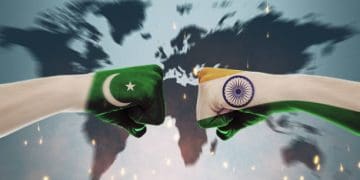Former U.S. President Donald Trump has reiterated his claim of using tariff threats as leverage in discussions involving India and Pakistan. Speaking about his role in easing tensions between the two neighbors, Trump said he warned Indian Prime Minister Narendra Modi that Washington could impose “very high tariffs” if hostilities were not reduced.
“I am talking to a very terrific man, Prime Minister of India, Narendra Modi. I said, ‘What’s going on with you and Pakistan?’ The situation was very tense,” Trump recounted, claiming his intervention led to a breakthrough.
India, however, has consistently dismissed Trump’s assertions, stating that decisions on de-escalation were reached through direct talks between senior Indian and Pakistani military officials, without third-party involvement.
Trump further said that he relied on trade and tariff tools as part of his broader strategy during his presidency. “I said, ‘We’re not going to make a trade deal with you, or we’re going to put tariffs on you that are so high, your head’s going to spin.’ Within about five hours, it was done,” he claimed, suggesting that the situation was resolved quickly after his talks with New Delhi.
This is not the first time Trump has made such claims. Since 2020, he has repeatedly stated that he played a key role in reducing tensions between the two countries, often emphasizing the use of tariffs and trade pressure as negotiation instruments.
India maintains that no external intervention influenced its decision-making. Officials in New Delhi have pointed out that ceasefire agreements and de-escalation measures were achieved independently through bilateral channels.
Trump’s remarks underscore his broader narrative of leveraging U.S. trade power in diplomatic matters. During his presidency, he frequently linked tariff policy with international negotiations, presenting trade measures as a tool for influencing foreign governments.
#TariffsAndDuties #TradePolicy #IndiaPakistan #USIndiaRelations #SupplyChainNews















